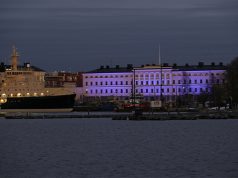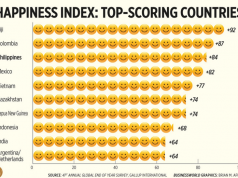Finland steadily ranks as the happiest country in the world. In March 2024 the country was, for the seventh year in a row, ranked as the happiness champion. The ranking is based on one simple question, using a ladder metaphor, that is asked to people across nearly every country in the world. But my team’s new experimental study suggests that the ladder metaphor makes people think about power and wealth.
Since 2005, the Gallup analytics organization has worked to measure happiness across the entire planet. The mission is particularly important as more and more governments say they are prioritizing the wellbeing of their people.
For example, all OECD countries now measure the happiness of their people including the UK. More than a decade ago, Bhutan declared that the primary goal of their government was “gross national happiness”, not gross domestic product.
The world ranking is based on one simple but powerful question, called the Cantril Ladder:
Please imagine a ladder with steps numbered from zero at the bottom to ten at the top. The top of the ladder represents the best possible life for you and the bottom of the ladder represents the worst possible life for you. On which step of the ladder would you say you personally feel you stand at this time?
As you read the question, what does the top of the ladder metaphor make you think of and what does it represent to you? Is it love, money, your family – or something else?
I recently led a group of researchers from Sweden, the US and the UK. We investigated these questions in a study on 1,600 UK adults, and published our results in Nature Scientific Reports. We carried out an experiment with five independent groups.
One group was asked what the top of the ladder represented to them. Another group was asked the exact same question, but this time the ladder metaphor, including the picture of the ladder, was removed and the term “ladder” replaced with “scale”.
Our study found that the ladder metaphor made people think more of power and wealth and less about family, friends and mental health. When the ladder metaphor was removed, people still thought of money, but more in terms of “financial security” rather than terms like “wealth”, “rich” or “upper class”.
In a third group, people interpreted a question where the ladder metaphor as well as the top v bottom description in the question were removed. In a fourth and fifth independent group, in addition to the above changes, the phrase “best possible life” was substituted with “happiest possible life” and “most harmonious life,” respectively.
People in the happiness and harmony groups thought less about power and wealth and more about broader forms of wellbeing such as relationships, work-life balance and mental health, compared to the other groups.
People don’t want the top of the ladder
My research team also asked people where they wanted to be on the scale of the different questions. Researchers often assume that people want the best possible life but, to our knowledge, no one had tested this. The results showed that in none of the groups did more than half the participants want a ten, the best possible life. The typical desire was a nine.
Except for the group with the ladder analogy. They typically wanted an eight. The ladder metaphor made people think more of power and wealth at the expense of relationships, mental health and work-life balance – and made people want a lower score.
What does this say about the happiness rankings where Finland are frequently the champions? Well, there is a risk that the ranking is based on a narrow, wealth and power-oriented form of happiness, rather than a broader definition. This does not mean that Finns are unhappy, but the type of happiness they excel at may be power and wealth-focused.
Our study findings raises the question of what type of happiness we want to measure. A person’s idea of happiness can’t be determined by a researcher. That is why researchers must ask people about their concept of happiness.
Research has shown that when people define happiness, they only mention wealth and status to a small degree. It is well established that money relates to wellbeing but the money effect is weaker than many other happiness factors, where good quality social relationships have the strongest effect.
Recent research from the University of Oxford shows happiness actually causes people to be more productive and the most important factor for happiness at work is belongingness. Salary, on the other hand, is believed to be the most important driver for happiness at work, but it turns out to be a much weaker driver of happiness at work than belongingness. This aligns with the general message from the happiness science that relationships are the most important factor for happiness.
What type of happiness do we want to measure?
Previous research has shown that the Cantril Ladder reflects people’s income levels and social status to a larger degree than other wellbeing metrics. The current study adds more evidence that perhaps the simple but powerful question could be supplemented with extra questions in the future, to clarify what people mean by happiness.
Our study was conducted solely in the UK, so of course this research should be performed in other countries too, given the global nature of this topic. However, our results indicate that we aren’t necessarily measuring happiness and wellbeing in a way that is in line with how we actually define those concepts in our lives.![]()
August Nilsson, PhD Candidante in Organizational Psychology, Lund University. This article is republished from The Conversation under a Creative Commons license. Read the original article.










